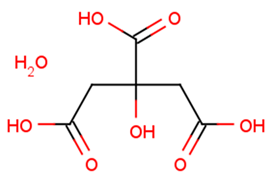
Citric acid monohydrate
CAS No. 5949-29-1
Citric acid monohydrate( —— )
Catalog No. M20347 CAS No. 5949-29-1
Citric Acid Monohydrate is a tricarboxylic acid found in citrus fruits. Citric acid is used as an excipient in pharmaceutical preparations due to its antioxidant properties. It maintains stability of active ingredients and is used as a preservative.
Purity : >98% (HPLC)
 COA
COA
 Datasheet
Datasheet
 HNMR
HNMR
 HPLC
HPLC
 MSDS
MSDS
 Handing Instructions
Handing Instructions
| Size | Price / USD | Stock | Quantity |
| 10MG | 49 | In Stock |


|
| 25MG | 75 | In Stock |


|
| 50MG | 113 | In Stock |


|
| 100MG | Get Quote | In Stock |


|
| 200MG | Get Quote | In Stock |


|
| 500MG | Get Quote | In Stock |


|
| 1G | Get Quote | In Stock |


|
Biological Information
-
Product NameCitric acid monohydrate
-
NoteResearch use only, not for human use.
-
Brief DescriptionCitric Acid Monohydrate is a tricarboxylic acid found in citrus fruits. Citric acid is used as an excipient in pharmaceutical preparations due to its antioxidant properties. It maintains stability of active ingredients and is used as a preservative.
-
DescriptionCitric Acid Monohydrate is a tricarboxylic acid found in citrus fruits. Citric acid is used as an excipient in pharmaceutical preparations due to its antioxidant properties. It maintains stability of active ingredients and is used as a preservative.
-
In VitroCitric acid monohydrate (0-12.5 mM; 24 h) shows antiproliferative activity in a dose dependent manner.Citric acid monohydrate (12.5 mM; 72 h) induces apoptosis and cell cycle arrest at G2/M phase and S phase in a dosedependent manner.Citric acid monohydrate (12.5 mM; 48 h) increases the expression of FAS, BAX, BID, AIF, EndoG, cytochrome c, PARP, GADD153, GRP78 and caspase-3, -8, -9, and decreases of BCL-2 and BCL-Xl.Cell Viability Assay Cell Line:HaCaT cells Concentration:0, 2.5, 5, 7.5, 10, 12.5 mM Incubation Time:24 h Result:Inhibited the cell viability in a dose dependent manner.Cell Cycle Analysis Cell Line:HaCaT cells Concentration:12.5 mM Incubation Time:0, 12, 24, 48, 72 h Result:Induced apoptosis and cell cycle arrest at G2/M phase and S phase in a dosedependent manner.Western Blot Analysis Cell Line:HaCaT cells Concentration:12.5 mM Incubation Time:12, 24, 48 h Result:Increased the expression of FAS, BAX, BID, AIF, EndoG, cytochrome c, PARP, GADD153, GRP78 and caspase-3, -8, -9, and decreased of BCL-2 and BCL-Xl.
-
In VivoCitric acid monohydrate (120, 240, and 480 mg/kg; i.p.) significantly decreases GSH-Px activity and induces an increase in the MDA (malonyldialdehyde) levels in mouse liver.Citric acid monohydrate (120, 240, and 480 mg/kg; i.p.) induces apoptosis by increases caspase-3 activity in a dose-dependent manner in mouse hepatocytes.Citric acid monohydrate (120, 240, and 480 mg/kg; i.p.; weekly for 3 weeks) causes renal toxicity in mice. Animal Model:20 g male Kunming mice Dosage:120, 240, 480 mg/kg Administration:I.p.; weekly for 3 weeks Result:T-SOD and GSH-Px activities in the treated groups decreased with increasing doses of citric acid, NOS activity tended to increase, and H2O2 and MDA contents gradually decreased.
-
Synonyms——
-
PathwayOthers
-
TargetOther Targets
-
RecptorOthers
-
Research Area——
-
Indication——
Chemical Information
-
CAS Number5949-29-1
-
Formula Weight210.14
-
Molecular FormulaC6H10O8
-
Purity>98% (HPLC)
-
SolubilityIn Vitro:?DMSO : 100 mg/mL (475.87 mM)
-
SMILESO.OC(=O)CC(O)(CC(O)=O)C(O)=O
-
Chemical Name——
Shipping & Storage Information
-
Storage(-20℃)
-
ShippingWith Ice Pack
-
Stability≥ 2 years
Reference
1.Goel A Zhao Z Dan S?rensen et al. Esterification of pseudoephedrine hydrochloride by citric acid in a solid dose pharmaceutical preparation[J]. Journal of pharmaceutical and biomedical analysis 2016 129:410-418.
molnova catalog



related products
-
Momordicin II
Triterpenoids
-
SLLK, Control Peptid...
SLLK, Control Peptide for TSP1 Inhibitor (TFA) is a control peptide for LSKL, which is a Thrombospondin (TSP-1) inhibitor.
-
Fleroxacin
Fleroxacin is a broad-spectrum antimicrobial fluoroquinolone. It strongly inhibits the DNA-supercoiling activity of DNA gyrase.



 Cart
Cart
 sales@molnova.com
sales@molnova.com


